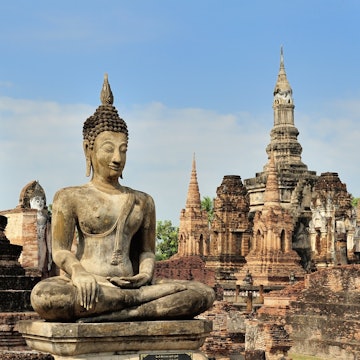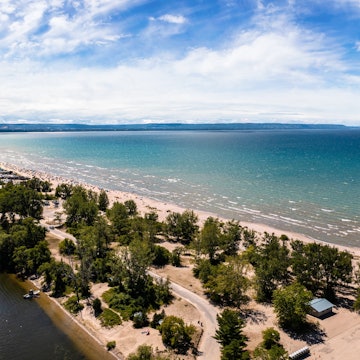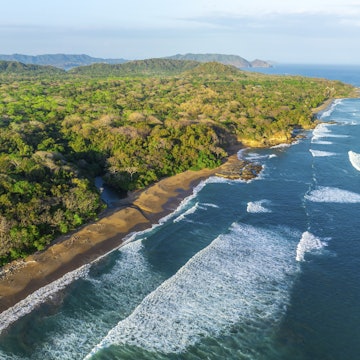
Are you ready to give up traveler privacy to fight the coronavirus?
Jul 16, 2020 • 6 min read

Travelers wear face masks as they pass through London's Heathrow Airport © Justin Tallis/AFP/Getty Images
Imagine arriving at the hotel in your travel destination only to be told that you won’t be given a room key because you can’t leave your room. In fact, you can’t even open the windows while you’re stuck there for two weeks. Instead, you’re brought pre-packaged breakfasts, asked questions about your medical conditions, and given the numbers to local mental health hotlines. The way this trip is looking, you might need them.
This describes the saga US-based contributing Marie Claire editor, Chloe Angyal, has been tweeting about since arriving in Australia on July 4. But Australia is far from the only country to have begun implementing forced quarantines and health checks for foreign travelers. Airports and airlines have also been taking measures ranging from temperature checks to rapid-response blood tests to curb the spread of COVID-19.
While such measures are good news for those rightfully worried about the virus’s spread, they also raise concerns about traveler privacy. Contact tracing requires surveillance, and health checks away from home mean giving up very personal information to foreign officials.
For travelers weighing the desire to journey against possible privacy infringements, here are some current measures to consider:
Temperature checks and mask requirements
In late June, Airlines for America, an organization that includes Delta, American Airlines, JetBlue, Southwest, United, and others, said it would “support” the Transportation Security Administration in conducting passenger temperature checks in airports. Those with temperatures too high to fly will get refunds for their missed flights. Most airlines now also require passengers to wear masks, besides the very young and those with certain medical conditions.

Plenty of people see these basic protective measures as infringements on civil liberties – spend just minutes scrolling through Twitter and you’ll find videos of “Karen” yelling for the manager about how it’s her right not to wear a mask at Trader Joe’s. But this is one of the least invasive ways people can protect others (and themselves) from falling ill.
Read more: No face mask, no flight: the new rule of travel?
Thermal cameras
Thermal imaging cameras have popped up in airports across the globe since the coronavirus outbreak, including London City Airport. There, travelers with higher body temperatures can be pulled aside and questioned about their health.
A representative from the airport said the system doesn’t store any personal data, including identifiable images of travelers. (It’s not the most effective way to track possible COVID-19 carriers, either – infectious people may not have fevers, and those with fevers may not have coronavirus.)

Contact tracing
Contact tracing from flights has been attempted as early as February for travelers landing in the US. In California, more than 11,000 travelers from China and then Iran were flagged for contact tracing. Soon after, however, the virus began spreading so widely in California that the measure became ineffective.
That said, the system is already more or less in place for airlines to track down virus-exposed travelers.
“Today, airlines hold contact information for the majority of the passengers on-board,” Joe Leader, CEO of the Airline Passenger Experience Association, wrote to Lonely Planet in an email. Third-party ticket sellers, however, may not provide customers’ contact information to airlines – but with COVID-19, they could be more likely to. “Even if the traveler does not authorize sharing, they may provide this information directly,” Leader says.
Apps and wearables
According to a June Slate article, more than 45 countries have developed wearable tracking apps, which could be “mandatory or strongly encouraged” for visitors to don upon arrival.
One popular travel destination, Hawaii, already walked back its plan to monitor tourists with GPS-enabled ankle bracelets after significant pushback related to privacy concerns. But outside of the US, requiring use of a tracking app is more familiar to locals and therefore easier to enforce with visitors. For example, in South Korea and Hong Kong, visitors have to download contact tracing apps once they arrive at the airport.
In Hong Kong, those apps connect to QR-encoded wristbands not unlike those you’d wear at a concert to show you’re old enough to drink. Travelers must wear them for two weeks, using the bracelets to periodically prove they haven’t left their designated quarantine spot (a place they must scan the perimeter of using the app).
As the Electronic Frontier Foundation cautions, “Even a low-tech, non-electronic bracelet with a unique code can play a significant role in making new kinds of surveillance feel familiar and normalized.”

Biometric identification
Some air travelers already give away their biometric information before getting to their departure gate. CLEAR customers scan their fingerprints to skip long security lines, and they may no longer be alone.
CLEAR’s new product, Health Pass, connects biometrics (face, eyes, and fingerprints) to a person’s health data, and the company’s working on getting wider adoption of its product to help fight COVID-19. CLEAR’s established connection with airports means those could be among the first places to use Health Pass.
Meanwhile, Australia’s Department of Home Affairs recently launched a biometric identification system to scan those entering the country, though it’s been in the works since before COVID-19. Hawaii airports, too, are testing facial recognition technology, which the American Civil Liberties Union has called “terrifying.”
“Get ready for the biometric wave, because it’s coming,” says aviation security expert Jeff Price. “It was in motion before the pandemic…[the aviation and security industries] are truly looking for paperless travel, where your face becomes your ticket.” Biometric data can be then be tied to social media profiles, or used to track down travelers wanted by the law, Price adds.

Forced quarantines
Currently in effect for US residents traveling to a number of countries, forced quarantines generally mean new arrivals have to give their exact destination address and contact information to government officials and remain in that location without leaving for two weeks. In the UK, those who don’t comply can face up to £3,200 in fines.
Other countries have even more extreme guidelines. The New York Times lists several, including Bermuda, where mandatory COVID-19 tests await travelers not just at the airport, but also three additional times during the first two weeks of their stay – something Angyal also had to look forward to during her forced quarantine in Australia.
The future of COVID-19 air travel measures
Echoed across many privacy experts is the concern that changes made now to help curb the spread of coronavirus will remain in place in the long-term. Just as increased airport security has been normalized in the wake of September 11 so may biometric scans in airports and healtth checks upon arriving in foreign countries.
However, as Price points out, making biometric scans a mandatory part of air travel has been in the works for a while. The pandemic just speeds up the process. In the meantime, Price sees measures like mandatory mask wearing on airplanes remaining in effect for “a long time.”
“[COVID-19] is never just going to vanish,” says Price, who has three autoimmune diseases. “Once people realize this is like the flu, it’s going to come every year…we’ve still got to live.” Measures aimed at keeping travelers safe, including those that collect personal data, may live on, too.
You might also like:
Why virtual tours are here to stay
An expert's safety checklist if you need to travel now
Is this the end of hostels as we know them?













